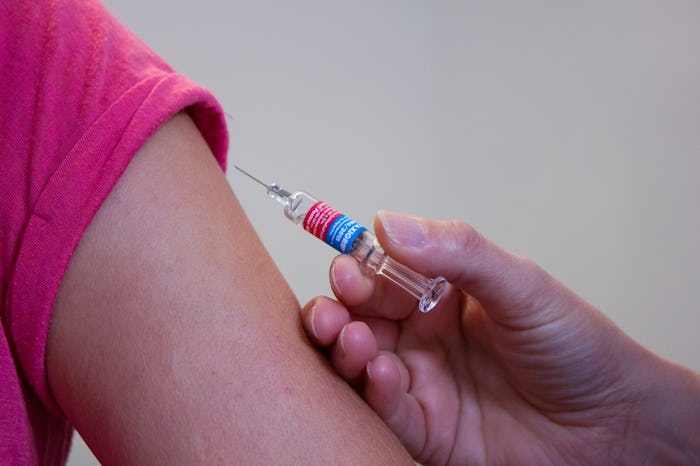Life

How "Trumpcare" Will Affect Vaccinations
The GOP finally released its long-awaited bill meant to repeal and replace the Affordable Care Act, otherwise known as Obamacare. The American Health Care Act — which you could call "Trumpcare" — maintains some provisions of the ACA, but also makes many changes. Some of those changes aren't immediately obvious, and many people have questions. For parents especially, one question is how will "Trumpcare" affect vaccinations? As it turns out, funding cuts could make them less accessible.
While some of the intended ramifications of Trump's bill are obvious — like effectively defunding Planned Parenthood — there are some that aren't quite so obvious at first glance. Since it was released Monday night, healthcare policy experts, physicians, and the general public have been pouring over the draft of the bill trying to understand what it means for America's healthcare coverage.
While some popular provisions are staying intact for the time being — like young adults getting to stay on their parents' policies until they're 26 years old — some of the major differences between the bills are worrisome. In immediate effect, the bill would undo the income-based subsidies that helped many people get insurance through the marketplace and replace them with tax credits. Those credits — from $2,000 to $4,000 — are based not on income, but age, and while they will no doubt off-set the cost of health insurance premiums for many, they will hardly make a dent for others.
One of the totems of the Affordable Care Act was to ensure that people had access to preventative care services. While there are some healthcare needs that we only require at certain times in our lives, preventative care is one type of healthcare that we need starting before we're born right up until our very old age. From prenatal screenings to childhood vaccinations to wellness exams throughout our life, these are essential not just to our health, but the collective public health, too.
When it comes to vaccines specifically, President Trump has a long history of criticism, mostly as it pertains to false claims that they cause autism. While that justification doesn't appear in the bill, the American Health Care Act does plan to defund a program that Obamacare started, which, among other things, helped make sure hospitals and doctors' offices had enough vaccine supplies.
The Prevention and Public Health Fund was the first mandatory fund for public health in the U.S., and was "to provide for expanded and sustained national investment in prevention and public health programs to improve health and help restrain the rate of growth in private and public health care costs." Some of that fund helped with the nation's vaccine program, which not only helps maintain a necessary supply of various vaccines, but helps handle outbreaks, and create programs that allow people to get vaccinated if they're uninsured.
The American Health Care Act intends to eliminate the funding and cut the Centers for Disease Control's overall budget by 12 percent by 2019, according to Vox. Without adequate funding, the ability for vaccines to be produced and supplied in the numbers needed to keep the American public healthy could be greatly compromised: whether it be that influenza cases go up, or we see a resurgence of vaccine-preventable diseases, slashing these funds could pose a serious public health crisis.
While influenza and the MMR (measles, mumps, rubella) vaccines are the ones that usually get the most attention, there are a number of vaccines that are integral to public health: whooping cough, polio, hepatitis A, rabies, HPV, tetanus, smallpox, shingles, tuberculosis, typhoid, varicella (chicken pox), and several meningococcal diseases are all vaccine-preventable. But vaccines can't work properly on an individual basis: many people need to have access to them to create "herd immunity" in our communities. Because some people are unable to be immunized — like infants who are too young for their first booster, but can still be infected — community immunity helps protect them, too. Vaccines need to be made widely available to be truly effective, and if people aren't able to be vaccinated either because their insurance won't cover it, or their doctors' office runs out, the likelihood of a serious outbreak like what gets depicted in science fiction could easily become a reality.